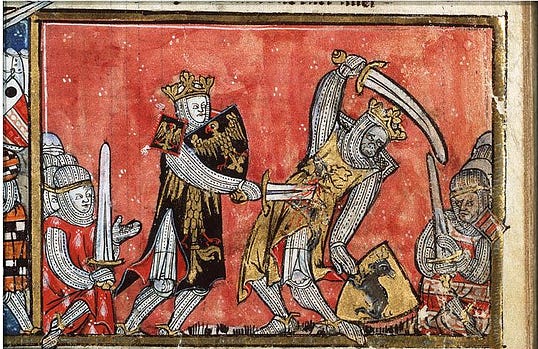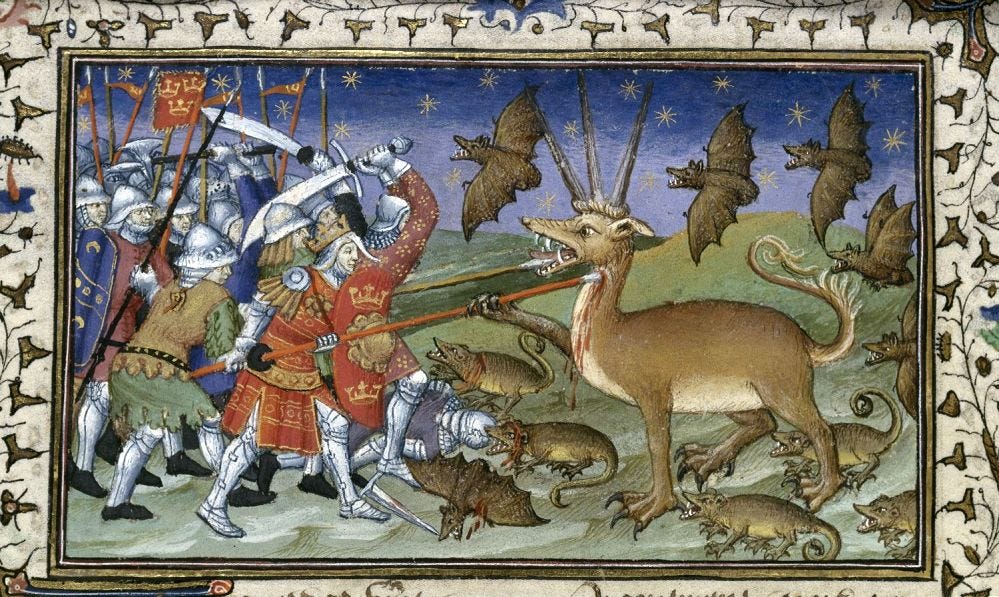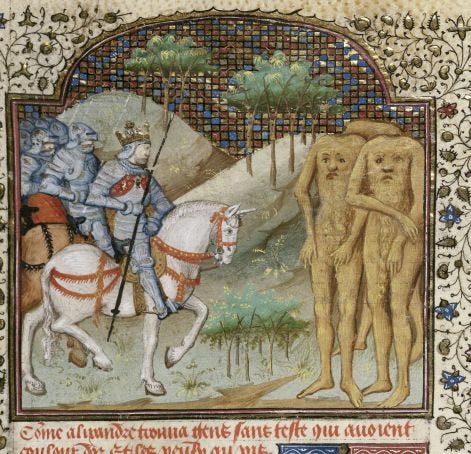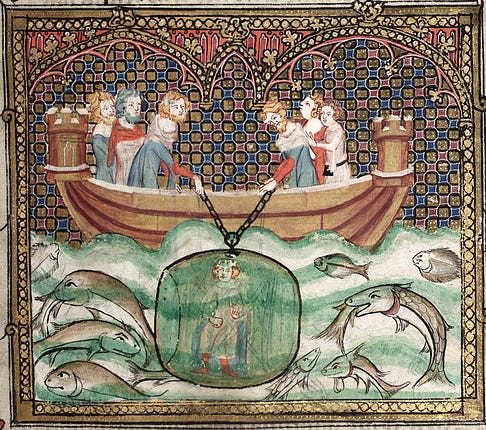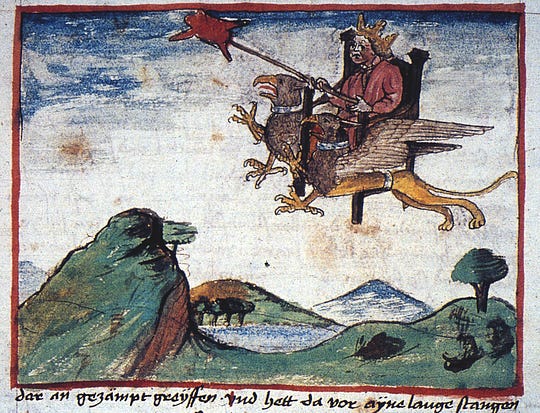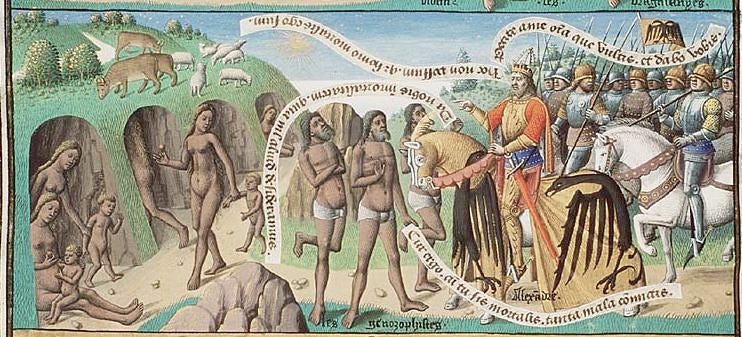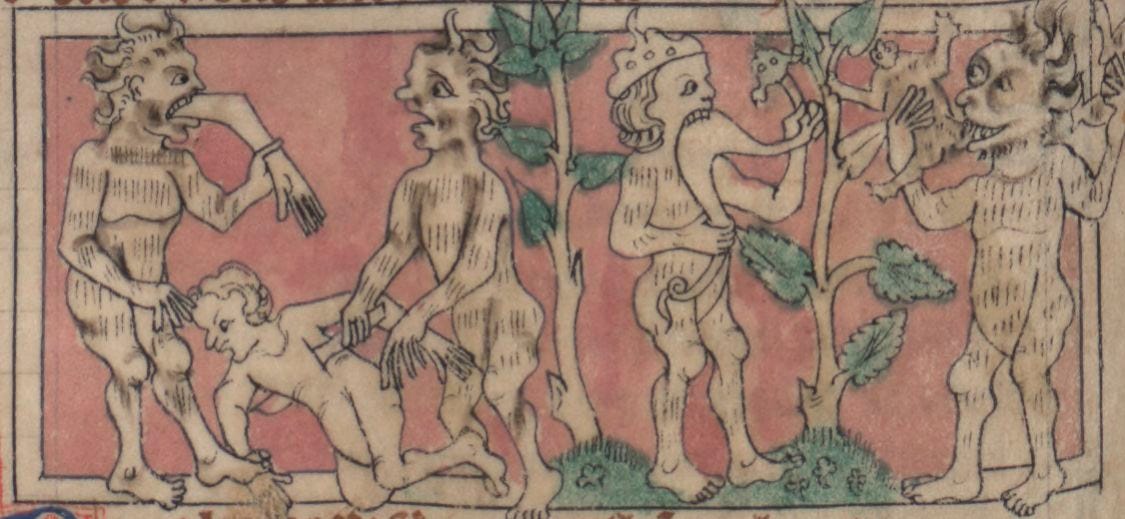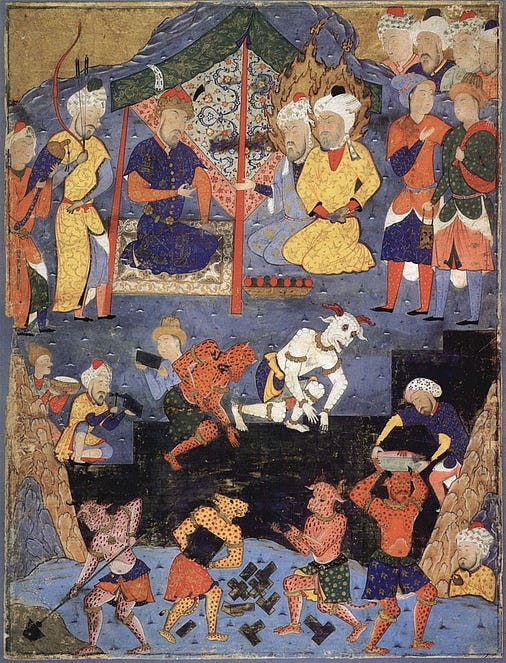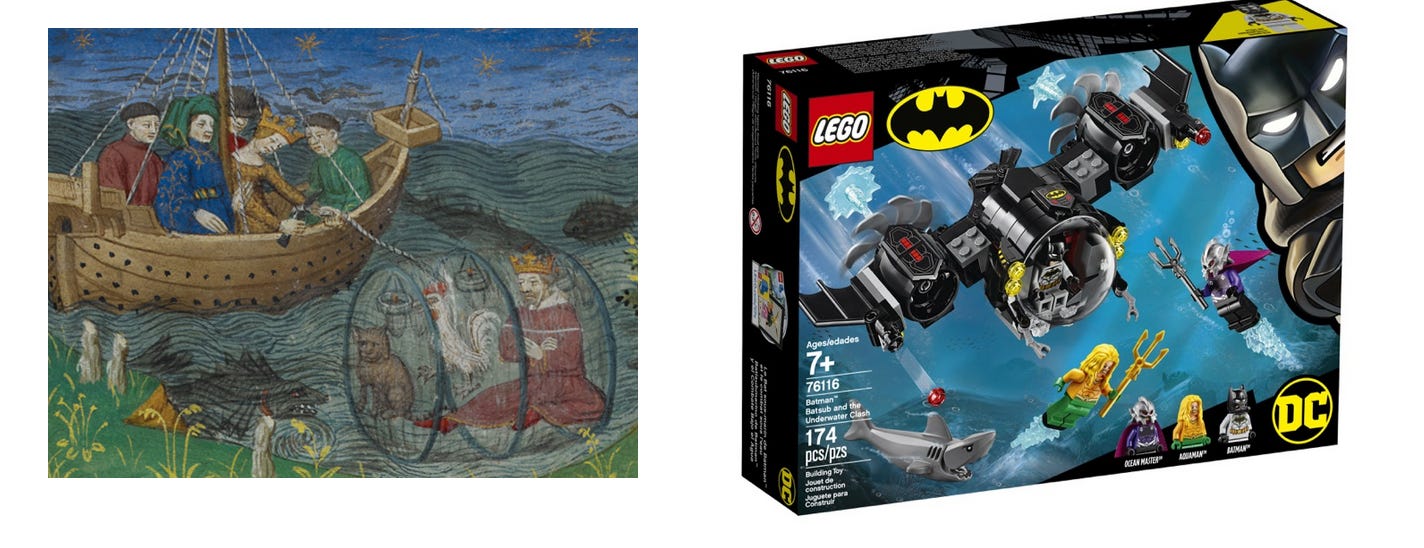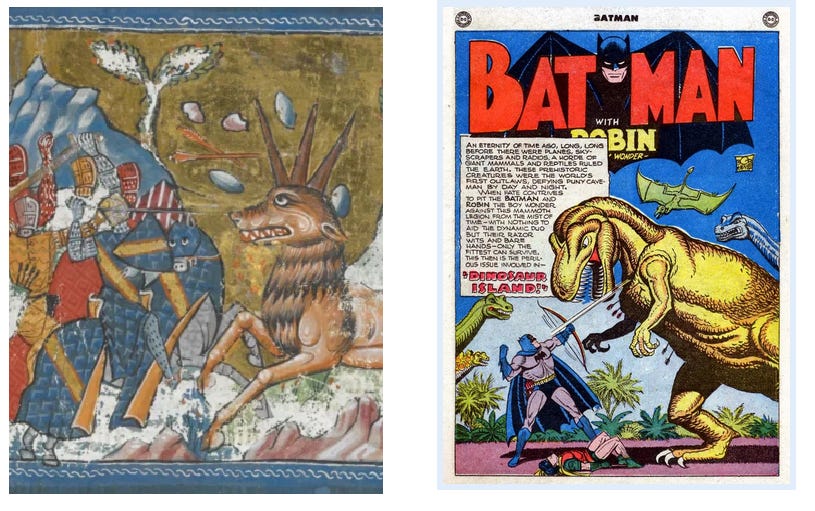Astral Codex Ten - Book Review: The Alexander Romance
[if this looks familiar to you, see explanation here]Sometimes scholars go on a search for “the historical Jesus”. They start with the Gospels, then subtract everything that seems magical or implausible, then declare whatever’s left to be the truth. The Alexander Romance is what happens when you spend a thousand years running this process in reverse. Each generation, you make the story of Alexander the Great a little wackier. By the Middle Ages, Alexander is fighting dinosaurs and riding a chariot pulled by griffins up to Heaven. People ate it up. The Romance stayed near the top of the best-seller lists for over a thousand years. Some people claim (without citing sources) that it was the #2 most-read book of antiquity and the Middle Ages, after only the Bible. The Koran endorses it, the Talmud embellishes it, a Mongol Khan gave it rave reviews. While historians and literary critics tend to use phrases like “contains nothing of historic or literary value”, this was the greatest page-turner of the ancient and medieval worlds. There is no single Alexander Romance. Every culture from Ethiopia to Russia added their own bits and adapted it to their own needs. The Persian version changes things around so that Alexander is secretly the descendant of the rightful Shah of Persia; the Jewish version adds bits about how Alexander knelt before the High Priest of Jerusalem and said that the LORD was the one true God. Someone from Syria added the bits about Gog and Magog; nobody knows who added the parts with the 36-foot-tall giants, the three-eyed lions, the sphere-people, or the headless men. This makes it hard to review “the” Alexander Romance - some historians describe it as more of a genre than a single story. The outline below will be based on Penguin’s The Greek Alexander Romance, a pastiche of several versions keeping the skeleton of a 15th century Sicilian manuscript. Its history ensures that it’s wildly uneven; some parts seem to be mostly a real history of Alexander with a few embellishments; others are obviously completely imaginary. I’m going to assume you know Alexander’s real conquests and focus on the imaginary parts: The Birth Of Alexander Nectanebo was a pharaoh who was also a wizard. He ruled Egypt wisely; when enemies attacked, he would magically vaporize their armies from afar. One day he scryed some enemies approaching Egypt’s border (probably the Persian army of Cambyses?); when he tried to vaporize them, the magic didn’t work. He realized that the gods had decreed that Egypt must fall, so he fled to Macedonia, working as a magician-for-hire to make ends meet. Queen Olympias couldn’t produce an heir, so she hired the local magician to restore her fertility. Nectanebo fell in love and wanted to have sex with her. So he told her that she wasn’t conceiving because the god Ammon had destined her to bear his demigod son; her problem was that she was having sex with her husband, King Philip, instead of Ammon. When Olympias was skeptical, Nectanebo cast a spell that made her have a dream where Ammon appeared to her and said this was definitely true. Convinced, she agreed to lie in wait for Ammon when her husband was away on campaign. Nectanebo cast a spell to make himself look like Ammon and had sex with her, and she became pregnant. King Philip came back from campaign and was angry, so Nectanebo transformed into a giant snake, slithered up to Olympias at a state event, kissed her, then transformed into an eagle and flew away. Everyone accepted this as proof that Olympias had been chosen by a god, and King Philip withdrew his complaint. Nectanebo then became the court doctor, advising Queen Olympias on when to give birth. As her labor began, he advised her not to push, because the astrological chart was less than perfectly ideal. For hours, the poor woman tried to hold it in, as Nectanebo became increasingly agitated about improper positioning of Mercury or whatever. Finally, Nectanebo cast the horoscope and found that the destiny of someone born at that exact moment would be to rule the world. He told Olympias to push, the baby came out immediately, and they named him Alexander. Alexander And Darius (yes, we are skipping a lot) As Alexander advanced, King Darius of Persia sent him increasingly insulting letters, to which Alexander sent back letters with dazzlingly witty responses to the insults. For example, from Darius, heavily edited for length:
Alexander back to Darius:
Darius then tried sending Alexander several more letters, all of which have a vibe of “yeah, well the jerk store called, and they’re out of you”. When Alexander was camped outside the Persian capital, he (at the instigation of the god Ammon, or maybe Hermes) tried a crazy gambit: he pretended to be “Alexander’s messenger to Darius”, and went into the Persian capital to deliver a generic message. Darius invited him to stay for dinner, and all the Persians were awed by the godlike appearance of this “messenger” (also, the text offhandedly mentions, then never brings up again, that Alexander was only four feet tall, and everyone was surprised by this). During the dinner, Alexander kept pocketing the gold and silver dishes in his cloak. Someone complained, and Alexander made a big show about how when King Alexander gave banquets in Macedonia, he always let guests take the dishes home as souvenirs, and he assumed the custom in Persia would be the same, but if they’re so stingy that they won’t even let him take a few dozen solid gold plates, then fine, he’ll just have to report that back to the Macedonian people. At this point the Persians started to feel like he was putting them on, one former ambassador recognized Alexander and sounded the alarm, and he had to get out of there quick. Luckily, Alexander outran everyone in Persepolis, slipped through the gates, and made it back to his own camp. Also, his camp was across a river that froze and melted in an alternating cycle once every few days, and he ran across it just at the moment it melted, so the Persians were stuck on the other side and couldn’t pursue him. The next day, Alexander ordered battle against the Persians. The Macedonians were outnumbered but won easily; King Darius fled back to his city, plotting to raise another army and get revenge. However, two Persian traitors, hoping to be rewarded by Alexander, murdered Darius, then ran off. Alexander reached the city just as Darius was dying. With his last few breaths, Darius admitted Alexander had always been the better man, and that he was deeply happy Alexander would rule Persia from then on, and how he voluntarily relinquished the kingship to him, and how Alexander must marry his daughter. Alexander wept bitterly over Darius’ death, and vowed to rule Persia wisely and marry Darius’ daughter. Then he went back to the crowd and said that the people who killed Darius should come forth so he could reward them - “I swear I will raise them up and make them conspicuous among men.” Darius’ killers came forth, and Alexander crucified them, explaining that he didn’t break his oath because he sure did make them high up and conspicuous. Alexander In India Perhaps you have heard that Alexander tried to conquer India, but his troops mutinied, and he had to turn back. This is an absurd lie. His troops tried to mutiny, but Alexander talked them down with a brilliant speech. Then he challenged Porus, King of India, to single combat, and won. Alexander At The Ends Of The Earth India was the easternmost part of the known world, so Alexander got curious what was east of India and decided to march there and find out. His first night east of India, he was attacked by a triceratops. At least this is how I interpret the odontotyrannus (“tooth-tyrant”), a three-horned monster bigger than an elephant that killed 26 Macedonian warriors. In the Syrian version, it took 300 men to drag its body out of a river; in the Armenian version, 1,300. Next, Alexander encountered peoples with various combinations of body parts. One arm and three eyes! Three eyes and one arm! Five legs, two noses, seven ears! All of these kind of blend together to me. Highlights are the giants (36 feet tall, killed 100 Macedonians), the spherical giants (with “expressions like lions”), the fleas as big as frogs, the men with hair all over their bodies, and the 30 foot long donkeys. Here is a picture of Alexander encountering approximately the only group of people east of India who have normal human height and the correct number of eyes and limbs: Next, they came to an ocean, where many soldiers were eaten by giant crabs. Alexander was fascinated, and invented the diving bell so he could see what was underneath the ocean. After a series of dives, he got down 460 feet before a fish ate his diving bell, then vomited him up on dry land. Alexander interpreted this as a sign from God (who in this version is singular, and who Alexander totally believes in) to stop trying to plumb the depths of the ocean. Next, they came (how? isn’t the ocean in the way?) to a land of total darkness. In the middle of the land was the Fountain of Youth (how did they see it?) Alexander’s cook tried to boil dried fish in Fountain-of-Youth-water, but the fish came back to life. When he noticed, he suspected it might be the Fountain of Youth, so he drank the water himself and kept a jar for later (but for some reason didn’t tell the rest of the army). Later he gave the extra jar to Alexander’s daughter Kare. Still later, when they were too far away to return, Alexander heard that they had learned the secret of immortality and not given him any, and he cursed them. The cook went off to become an immortal water spirit, and Kare an immortal desert spirit. Finally, Alexander reached the end of the world, “where the sky meets the earth”, which was inhabited by griffins (other sources say big white birds that ate carrion). He ordered his men to capture two of the griffins and starve them for a few days until they were very hungry. Then he attached them to a chariot, sat in the chariot with a fishing rod attached to a piece of meat, and dangled it above them. The griffins started flying as hard as they could, lifting him into the air. Higher and higher Alexander went, until “a creature in the form of a man” approached him and said:
Alexander And The Naked Philosophers Alexander heard that there were some wise naked philosophers in India and decided to test their wisdom. Slightly edited:
Then they criticized Alexander for being too proud and starting too many wars. Alexander answered:
There is a weird echo of this story in, of all places, the Talmud, although here Alexander is interviewing the sages of Israel, who we assume are clothed. Taken from here, slightly edited:
Alexander Binds Gog And Magog Alexander came to the Caucasus Mountains and learned that the nations beyond the Caucasus Mountains - especially two called Gog and Magog - really sucked. Just utter trash nations. You would not believe how terrible these nations were:
There was a place where the Caucasus Mountains narrowed to an 18 foot pass. Alexander stopped before this place and prayed very earnestly, and God heard him and pushed the mountains closer together. Then Alexander built a giant gate in between the mountains, and he planted brambles for 3000 miles in every direction, and watered them so the brambles made a giant mass of thorns that covered the mountains for 3000 miles, so that the unclean nations could never get through. In case you’re wondering, in addition to Gog and Magog, this saved us from the nations of “Anougeis, Aigeis, Exenach, Diphar, Photinaioi, Pharizaioi, Zarmatianoi, Chachonioio, Agrimardio, Anouphagoi, Tharbaioi, Alans, Physolonikaioi, Saltarioi, and the rest.” I recognize two of these: the Sarmatians and the Alans - as real steppe tribes. The others are probably imaginary steppe tribes meant to represent how big and scary the steppe was in the Mediterranean imagination. The Caspian Gates of Alexander are sometimes identified with the real-world Caucasus fortification of Derbent: The Alexander Romance And Popular Literature The Alexander Romance is, in many ways, not a very good book. Obviously it’s bad history, bad geography, and bad science. But it’s not even consistent with itself. Alexander, we are told, isn’t the son of the god Ammon, but of the Pharaoh Nectanebo. But when he goes to the Oracle of Ammon in Libya, the god says he is his son, and charges him with founding Alexandria. But when he gets to Alexandria, he learns the city has been foreordained by the god Serapis, almighty ruler of Heaven and Earth. But by the time he’s in the Caspian, he makes a prayer worthy of any saint to the Judeo-Christian God, who answers his plea with a miracle. Some of these contradictions are the effect of dozens of different versions haphazardly combined by Penguin Classics, others by the ancients themselves. Alexander’s character shifts rapidly based on whatever lets him make the wittiest comment at that exact moment. Sometimes he plays the humble sage, talking about how nobody can know the movements of Providence. Other times pagan gods literally appear to him and tell him that his endeavors will be successful, and he responds by doing them with maximal flair since they can’t possibly go wrong. Sometimes he spares the lives of his enemies with flowery speeches about the importance of mercy, other times he kills people for seemingly minor infractions. Sometimes he displays superhuman genius, other times he needs to be rescued by wise old men who know the ways of the world. The only constant is that he is always the best at everything (at age 15, Alexander entered the Olympics and won the chariot race so completely that all of his opponents literally died). The other characters are no better. Darius is a sneering villain until the moment of his death, when he gives a lovely speech about how great Alexander is and how much he deserves his victory. King Philip, Alexander’s step-father, makes a similar heel-face turn in his dying moments. The authors are clearly writing under a constraint where Alexander needs enemies or else he can’t demonstrate his superiority, but also they can’t have somebody die without having admitted that Alexander is better than they are. The result is a lot of deathbed confessions. You can see the zigs and zags where one culture seizes control of the narrative, then gives it up. Alexander spends a while standing on the site of Alexandria, talking about how it will be the greatest city in the world by far and extend until the end of time, and how its patron god Serapis is the true god of the universe - then leaves and basically never thinks about either of them again. I am told there is a version written by Persians where Alexander is the son of a Persian Shah instead of an Egyptian Pharaoh, and a version written by Jews where Alexander kneels before the High Priest in Jerusalem and agrees that Judaism is the true religion. After Alexander’s death, the generals read out his will, which begins with effusive and totally-unrelated-to-anything-that-has-happened-before praise for the city of Rhodes, its people, and its glorious history; in the footnotes, the editor writes “one may suspect a Rhodian had a hand in the addition of the first four paragraphs”. And the prose can best be described as “overwrought”. Here’s Alexander’s death after being poisoned:
So it is not a very good book. Still, I will say this for it: I finished it in a day, when better books have taken me months. We divide “high culture” from “mass culture”. High culture, those books that plumb the depths of the human spirit, go from the Iliad through the great Greek tragedies through Dante and Shakespeare and so on to Tolstoy, Proust, and Knausgaard. Mass culture - those books that the average person finds entertaining - might also start with the Iliad, but ends up at Dan Brown, J.K. Rowling, and Batman comics. Mass culture follows somewhat different rules than its more prestigious relative: War And Peace sits perfect and untouchable in the temple of genius, but Batman is invented anew every few years. Really Batman is less of a specific book or movie and more of a genre. The genre has some conventions: the protagonist must be a man named Bruce Wayne with a secret identity as a bat-themed superhero; he should be accompanied by a butler named Alfred and a sidekick named Robin; he should live in a city called Gotham. And it has some suggestions: if you need a villain, how about the Joker? If you need a style, how about dark and gritty? Beyond that, anything goes. You can write a story of his origin only tangentially related to anyone else’s, you can add in new adventures, you can shift the tone from gritty to campy and back. Almost everything that happens to Alexander the Great in The Alexander Romance has also happened to Batman. Alexander invented a submersible to explore the ocean depths; Batman has done the same. Alexander discovered the Fountain of Youth, and so did Batman. Alexander sealed evil nations behind a magic door, and so did Batman. Alexander fought dinosaurs; Batman did too. The Alexander Romance is bad in exactly the way comics are bad, and for the same reason. The absolutely bonkers plotlines, the hopelessly bungled continuities, the confusion about its own theology and metaphysics, even the tug-of-war adaptations by cultures trying to claim the hero as their own . . . . . . are all what happens when a character is too popular to stay trapped in a single presentation, and breaks loose into the collective imagination. Alexander the Great wasn’t the first superhero. That title must go to Hercules, or Gilgamesh, or someone completely forgotten. But he might have been the first superhero to get the full treatment, complete with his own extended universe. Also the first to have his own theme song (end of page 187, “Iambic lines on Alexander”):
The ending needs work. But the core is there! You're currently a free subscriber to Astral Codex Ten. For the full experience, upgrade your subscription. |
Older messages
Highlights From The Comments On Elon Musk
Monday, September 18, 2023
...
Open Thread 294
Monday, September 18, 2023
...
Book Review: Elon Musk
Sunday, September 17, 2023
Not the new one, sorry
Book Review Contest 2023 Winners
Sunday, September 17, 2023
...
Highlights From The Comments On Last Week's Model Cities Post
Monday, September 11, 2023
...
You Might Also Like
Rocket’s $1.75B deal to buy Redfin amps up competition with Zillow
Monday, March 10, 2025
GeekWire Awards: Vote for Next Tech Titan | Amperity names board chair ADVERTISEMENT GeekWire SPONSOR MESSAGE: A limited number of table sponsorships are available at the 2025 GeekWire Awards: Secure
🤑 Money laundering for all (who can afford it)
Monday, March 10, 2025
Scammers and tax evaders get big gifts from GOP initiatives on crypto, corporate transparency, and IRS enforcement. Forward this email to others so they can sign up 🔥 Today's Lever story: A bill
☕ Whiplash
Monday, March 10, 2025
Amid tariff uncertainty, advertisers are expecting a slowdown. March 10, 2025 View Online | Sign Up Marketing Brew Presented By StackAdapt It's Monday. The business of sports is booming! Join top
☕ Splitting hairs
Monday, March 10, 2025
Beauty brand loyalty online. March 10, 2025 View Online | Sign Up Retail Brew Presented By Bloomreach Let's start the week with some news for fans of plant milk. A new oat milk, Milkadamia Flat
Bank Beliefs
Monday, March 10, 2025
Writing of lasting value Bank Beliefs By Caroline Crampton • 10 Mar 2025 View in browser View in browser Two Americas, A Bank Branch, $50000 Cash Patrick McKenzie | Bits About Money | 5th March 2025
Dismantling the Department of Education.
Monday, March 10, 2025
Plus, can someone pardoned of a crime plead the Fifth? Dismantling the Department of Education. Plus, can someone pardoned of a crime plead the Fifth? By Isaac Saul • 10 Mar 2025 View in browser View
Vote now for the winners of the Inbox Awards!
Monday, March 10, 2025
We've picked 18 finalists. Now you choose the winners. ͏ ͏ ͏ ͏ ͏ ͏ ͏ ͏ ͏ ͏ ͏ ͏ ͏ ͏ ͏ ͏ ͏ ͏ ͏ ͏ ͏ ͏ ͏ ͏ ͏ ͏ ͏ ͏ ͏ ͏ ͏ ͏ ͏ ͏ ͏ ͏
⚡️ ‘The Electric State’ Is Better Than You Think
Monday, March 10, 2025
Plus: The outspoken rebel of couch co-op games is at it again. Inverse Daily Ready Player One meets the MCU in this Russo Brothers Netflix saga. Netflix Review Netflix's Risky New Sci-Fi Movie Is
Courts order Trump to pay USAID − will he listen?
Monday, March 10, 2025
+ a nation of homebodies
Redfin to be acquired by Rocket Companies in $1.75B deal
Monday, March 10, 2025
Breaking News from GeekWire GeekWire.com | View in browser Rocket Companies agreed to acquire Seattle-based Redfin in a $1.75 billion deal that will bring together the nation's largest mortgage

